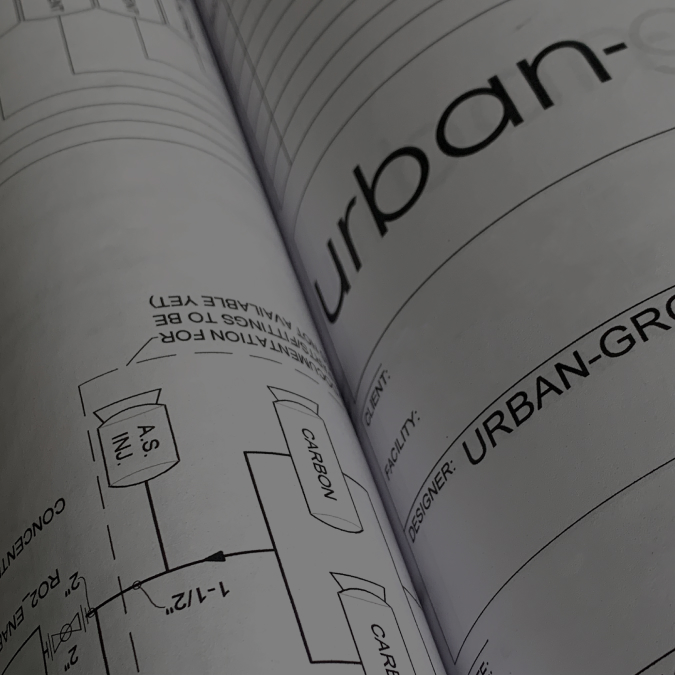
urban-gro Announces Financial Results for 2020 First Quarter
- Closed $6 Million Credit Facility;
- Environmental Sciences Recurring Revenue Increased 80%, or $900,000, to $2.0 Million from $1.1 Million in the 2019 First Quarter;
- Secured 18 New Engineering Design Projects;
- Customer Deposits against Future Shipments Increased to $3.6 Million from $2.9 Million at 12/31/19;
- Operating Expenses Decreased 16% over the 2019 First Quarter
Lafayette, Colorado, (July 7, 2020) – urban-gro, Inc. (OTCQX: UGRO) (“urban-gro” or the “Company”), a leading engineering design services company that integrates complex equipment systems into high-performance indoor cultivation facilities for the global commercial horticulture market, announced its financial results for the quarter ended March 31, 2020.
First Quarter Financial Summary
- The Company generated revenues of $4.3 million in Q1 2020, compared to $5.8 million in Q1 2019.
- Our revenues driven by environmental sciences increased $900,000, or 80%, in Q1 2020 compared to Q1 2019.
- We experienced a $1.6 million decrease in cultivation equipment sales, a $0.8 million decrease in complex equipment systems sales, and a $0.2 million decrease in professional services.
- The Company reported a net loss of $1.7 million in Q1 2020, compared to a net loss of $1.5 million in Q1 2019.
- The net loss is primarily related to a decrease in sales volume as a result of project delays due to the impacts of COVID-19.
- As outlined in the table below, on a Non-GAAP basis, Adjusted EBITDA was a negative $903,000 in Q1 2020, compared to a negative $734,000 in Q1 2019. See reconciliations of all non-GAAP to GAAP measures presented in this release in the table below.
- Cash on hand at the end of Q1 2020 was $570,000, as compared to $449,000 as of 12/31/2019.
- Prepayments made to vendors for cultivation equipment increased to $1.7 million compared to $1.3 million as of 12/31/2019.
- Customer deposits on signed design and equipment contracts increased to $3.6 million compared to $2.9 million as of 12/31/2019.
- Gross Profit remained stable, decreasing from a percentage of revenue of 28% in Q1 2019 to 26% in Q1 2020.
- The Company increased engineering design services project contracts from 13 contracts in Q1 2019 to 18 contracts in Q1 2020.
- Operating expenses decreased by $0.5 million, or 16%, to $2.5 million in Q1 2020 compared to $3.0 million in Q1 2019.
- The decrease in operating expenses was due to reductions in marketing related expenses, stock-based compensation expenses and salary related expenses.
- The Company entered into a Credit Agreement providing a $2.0 million term loan facility and a $4.0 million revolving credit facility.
Management Commentary
Bradley Nattrass, Chairman and CEO of urban-gro stated, “The Coronavirus Pandemic has upended nearly every industry, and the impacts have been felt by those serving the cannabis sector. With a strategic reduction in our operating expenses and downsizing of our team in Q1 2020, we believe we have minimized the potential damage wrought by COVID-19. The area of greatest impact for urban-gro has been project delays and the deferral of associated revenue. While we had shipments push into Q2 2020, we have been fortunate not to lose any projects. In the ‘new normal,’ our Company has shown great resilience in providing the high-quality engineering design services and environmental sciences our customers rely on and expect.”
COVID-19 Pandemic
With the unprecedented health impacts of COVID-19 in the first quarter of 2020, the World Health Organization declared the outbreak of the coronavirus a pandemic, and Stay-At-Home Orders were issued by many states and cities. While this had an immediate negative impact on our customers’ businesses, as well as ours, many states designated the cannabis industry – both operators and ancillary businesses – as an essential industry. We have remained actively engaged with our customers’ current and future projects.
Recognizing the economic uncertainty brought on by COVID-19 and the potential negative impact on our business, we proactively took the following actions at the end of Q1 2020:
- We executed a substantial reduction in discretionary marketing and general & administrative expenses;
- We reduced our headcount by 13 people (27%), from 48 to 35;
- We reduced compensation for almost all remaining employees on a graduated scale, led by a 20% reduction for the senior members of our leadership team; and
- On April 16, under the Paycheck Protection Program of the Coronavirus Aid, Relief, and Economic Security Act, we received a loan in the amount of $1,020,600.
“As a result of our realignment in Q4 2019, our cost-cutting actions in Q1 2020 and our ability to obtain third-party financing, we believe we have positioned the Company to weather the current economic challenges,” notes Dick Akright, CFO of urban-gro. “The fundamentals of our Company are strong due to the collective action of the entire company, and we remain confidently focused on attaining adjusted EBITDA profitability during the second half of 2020.”
Use of Non-GAAP Financial Information
We define Adjusted EBITDA as net income (loss) attributable to urban-gro, Inc., determined in accordance with GAAP, excluding the effects of interest expense, depreciation and amortization of acquired intangible assets and stock-based compensation. We use Adjusted EBITDA as a measure of our operating performance. Adjusted EBITDA is a supplemental non-GAAP financial measure. Adjusted EBITDA is not a substitute for net income (loss), income (loss) from operations, cash flows from operating activities or any other measure prescribed by accounting principles generally accepted in the United States of America ("GAAP").
Our board of directors and management team focus on Adjusted EBITDA as a key performance and compensation measure. Adjusted EBITDA assists us in comparing our performance over various reporting periods because it removes from our operating results the impact of items that our management believes do not reflect our core operating performance.
There are limitations to using non-GAAP measures such as Adjusted EBITDA. Although we believe that Adjusted EBITDA can make an evaluation of our operating performance more consistent because it removes items that do not reflect our core operations, other companies in our industry may define Adjusted EBITDA differently than we do. As a result, it may be difficult to use Adjusted EBITDA to compare the performance of those companies to our performance. Adjusted EBITDA should not be considered as a measure of the income generated by our business or discretionary cash available to us to invest in the growth of our business.
The following table reconciles net loss attributable to the Company to total Adjusted EBITDA for the periods:
|
|
|
Three Months Ended March 31, |
||||
|
|
|
2020 |
|
2019 |
||
|
Net Loss |
|
$ |
(1,695,631) |
|
$ |
(1,481,471) |
|
Interest expense |
|
|
298,634 |
|
$ |
99,971 |
|
Depreciation and amortization |
|
|
61,014 |
|
|
58,642 |
|
Stock-based compensation |
|
|
432,645 |
588,697 |
||
|
Adjusted EBITDA |
|
$ |
(903,338) |
|
$ |
(734,161) |
About urban-gro, Inc.
urban-gro, Inc. (OTCQX: UGRO) is a leading engineering design services company that integrates complex equipment systems into high-performance indoor cultivation facilities for the global commercial horticulture market. Our custom-tailored, plant-centric approach to design, procurement, and integration provides a single point of accountability across all aspects of indoor growing operations. We also help our customers achieve operational efficiency and economic advantages through a full spectrum of professional services focused on facility optimization, and integrated pest management programs that promote environmental health. In every engagement, our unwavering focus is on solutions that ensure success. Visit www.urban-gro.com to learn more.
Safe Harbor Statement
This press release contains forward looking statements within the meaning of Section 27A of the Securities Act of 1933 and Section 21E of the Securities Exchange Act of 1934. When used in this release, terms such as “believes,” “estimates,” “should,” “could,” “would,” “plans,” “expects,” “intends,” “anticipates,” “may,” “forecasts,” “projects” and similar expressions and variations as they relate to the Company or its management are intended to identify forward-looking statements. Such forward-looking statements are based on current expectations, forecasts, and assumptions that involve risks and uncertainties that could cause actual outcomes and results to differ materially from those anticipated or expected, including statements related to our ability to manage the adverse effect brought on by the COVID-19 pandemic, our ability to execute on our growth strategy, our ability to achieve positive cash flows or profitability, our ability to achieve cost savings, the sufficiency of our liquidity and capital resources, and our ability to achieve our key initiatives for 2020. A more detailed description of these and certain other factors that could affect actual results is included in the Company’s filings with the Securities and Exchange Commission. Readers are cautioned not to place undue reliance on these forward-looking statements, which speak only as of the date hereof. The Company undertakes no obligation to update any forward-looking statements to reflect events or circumstances after the date hereof, except as may be required by law.
For inquiries, please contact:
Investor Relations Contact:
Dick Akright, CFO
urban-gro, Inc.
Email: investors@urban-gro.com
Phone: 720-390-3880
Media Contact:
Stan Wagner
urban-gro, Inc.
Email: stan.wagner@urban-gro.com
Phone: 303-618-5080




